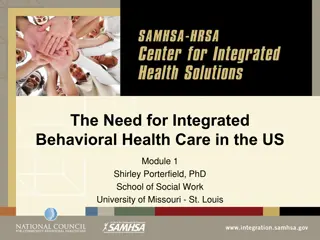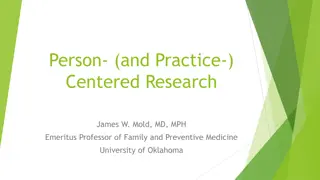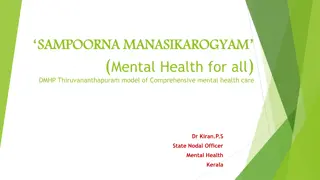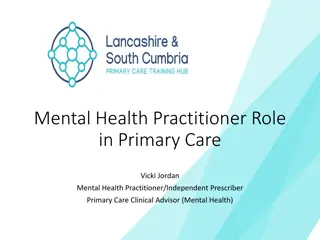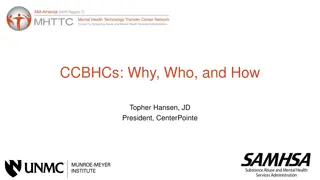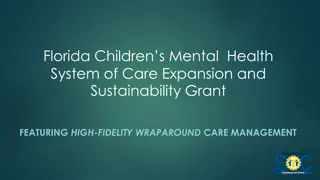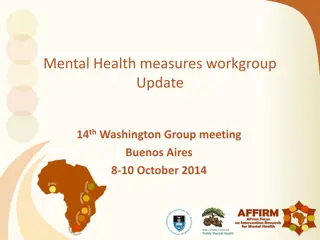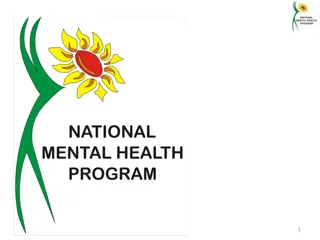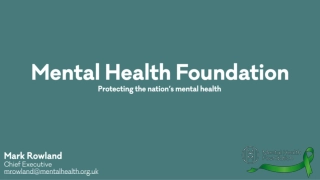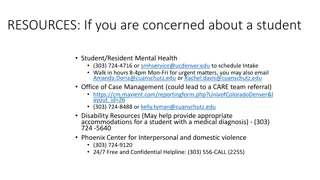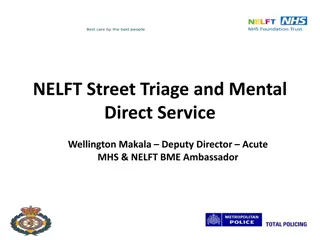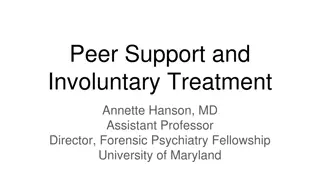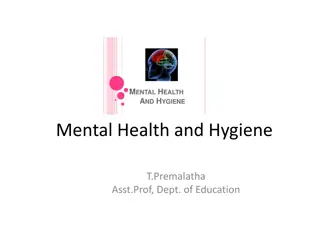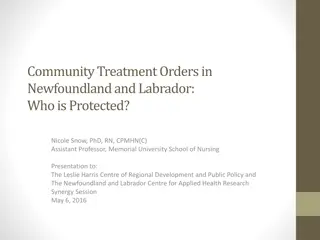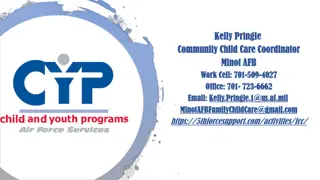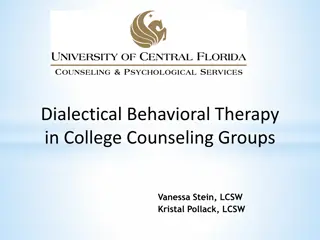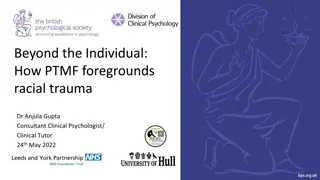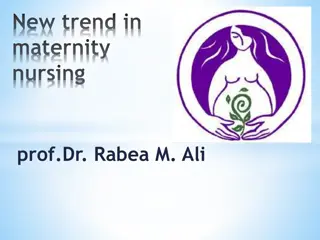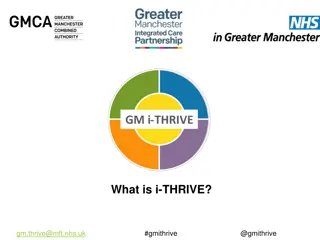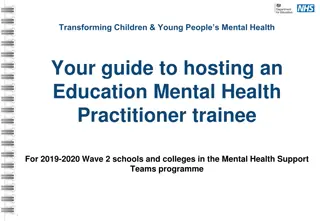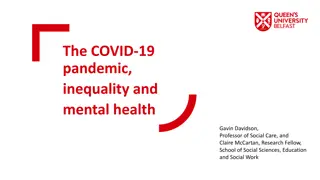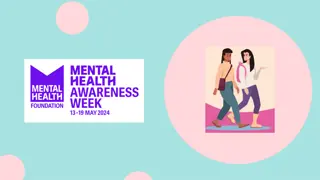Enhancing Family-Centered Care in Mental Health Programs
Explore the importance of family-centered care in mental health programs, focusing on empowering parents to drive their children's healthcare decisions. Learn how implementing this approach can revolutionize treatment experiences and outcomes for youth and families, offering a new level of results. Overcome historical beliefs and engage parents as informed partners in care delivery.
Download Presentation

Please find below an Image/Link to download the presentation.
The content on the website is provided AS IS for your information and personal use only. It may not be sold, licensed, or shared on other websites without obtaining consent from the author. Download presentation by click this link. If you encounter any issues during the download, it is possible that the publisher has removed the file from their server.
E N D
Presentation Transcript
1 Madenwald Consulting. LLC ACHIEVING THE PROMISE OF FAMILY-CENTEREDNESS IN CARE DELIVERY May 11, 2016 CMHACY Conference Kappy Madenwald, MSW Columbus, Ohio
2 Madenwald Consulting. LLC Family-Centered Care Family Centered Family Nice Family Driven
3 This centeredness stuff has broad applicability It works with adults, youth, parents But I am going to focus mostly on parents. Why? People who work with kids in the mental health field often find themselves frustrated by the responses, actions and behaviors of the parents of those kids Because most kid-serving teams and systems have done quite a bit to build their expertise in working with kids, but not their parents Because if we master the skills with parents, they are readily transferable to working with kids (but not so easily transferable the other way around)
4 Achieving the promise of family-centered care Provider engagement and activation of parents as informed and intuitive drivers of their children s health care is an under-developed skill set This is particularly true in the mental health field because of deeply held and historic beliefs about the ability of parents whose children have mental health and other behavioral conditions to make competent decisions To the degree that family-centered care is not already occurring in your practice and across your programs, it offers a opportunity to change the treatment experience for youth and their families and to achieve a whole new level of result. It is so much easier said than done
5 True-north concept of family-centered care
6 Madenwald Consulting. LLC
10 The difference in orientation is stunning
11 Re-thinking hospitalization LOW Expected Benefit HIGH High Benefit High Benefit Low Risk High Risk Low Benefit Low Benefit High Risk Low Risk LOW Iatrogenic Risk HIGH Quadrant Model for Re-Thinking Psychiatric Hospitalization. Source: Madenwald Consulting, LLC
12 This true north orientation is a big step For a traditionally trained provider, this is a massive reorientation And perhaps a leap of faith To reorient care to the lived experience of a parent To trust in the credibility of this experience, worldview, cultural understanding To view and engage the parent as capable, intuitive and able to collaborate An approach that I find very useful is to begin the journey by paying attention to the stories we are telling (and believing) about parents of kids with mental health conditions.
13 Madenwald Consulting. LLC A Story from the Road
14 Madenwald Consulting. LLC
15 Madenwald Consulting. LLC Think about the water cooler talk in your shop What are the stories being told about parents?
16 Madenwald Consulting. LLC Choosing to tell a better story Our worldview, comprised of deeply held beliefs, creates a (usually subconscious) lens through which we tell stories about people and their actions Forming stories is simply human nature. We tell stories based on limited information Our stories are influenced by our beliefs, experiences, training, climate, and personal journey It is natural to then believe the story we have made up is factual or is the only interpretation and we start acting accordingly
17 Madenwald Consulting. LLC Choosing to tell a better story When thoughts are habituated (the stories are all around us, repeated often) they become ingrained in our thinking and feel very factual Habits of thought that tell an unhealthy/pathological story about a person make it impossible to do person/family-centered work So, we have to figure out how to tell a better story, every time, and then Act as if the better story is true (and watch as the person becomes more likeable and compelling in your eyes)
18 Our story guides our actions If I am telling/believing a parent is the problem story how am I predisposed to act? If I am telling/believing a credible, capable, intuitive parent story, how am I predisposed to act?
19 Our story guides our actions It is an easy explanation that a parent is part of/cause of the problem But if I proceed with that belief even if it seems true it is counterproductive to parent engagement and that makes it harder to be useful to the child. This is a mental model that keeps me out of that mindset of parent as the problem
20 Stand in the shoes of a parent whose child is receiving crisis intervention services Think about the hours, days, months and sometimes years of struggle that preceded the crisis service As a parent, what has been the essence of the crisis for you, from your parent shoes? From your parenting shoes? Is your experience impacting your functioning? If so, how? How do suspect you are coming across to providers? Is your experience the same or different from the experience your child is having?
21 Stand in the shoes of a parent Periods of experiencing parent/parenting crisis states is an anticipated and normal component of the journey of any parent whose children experience mental health crises. Can your parent/parenting crisis be resolved even if your child s condition doesn t stabilize or improve? Why is this important?
22 Getting to the Essence of the Crisis You are collaborating with families who have led extraordinary lives Hard to sort it all out Fortunately, you don t have to understand all of the history in order to be of service But, you do want to understand the essence of the crisis for the youth AND for the parent(s), and sometimes other players too this is where a big opportunity for resolution lies Essence isn t fundamentally about the diagnosis Nor is it fundamentally about the problem
23 Getting to the Essence of the Crisis Fear Sadness Anger/rage Loneliness/isolation Restlessness/boredom Hopeless/helpless Uncertainty/ambivalence Anxiousness/nervousness Guilt Grief/loss Pain Exhaustion Hunger Lack Stuck Misery Powerlessness Shame
24 General rule of thumb Think STATE not TRAIT
25 Madenwald Consulting. LLC Getting to the essence of the crisis This holistic thinking coupled with telling the story of a credible, capable, intuitive parent predisposes us to get curious: What is HAPPENING? What do you NEED? What MATTERS? What do you CHOOSE? (Instead of what is wrong?) (Instead of what do you want?) (Instead of what is the matter?) (Instead of here is what is going to happen) And makes us less vulnerable to slipping into counterproductive care and it is a slippery slope
26 COUNTERPRODUCTIVE APPROACHES
28 Counterproductive approaches In the context of a research project on family-centered care, a number of counterproductive practices were identified. Three of the indicators have universal implications They are highly relevant in the context of safety planning and the provision of resolution-focused support and intervention Olin, S.S. Kutash, K., Pollock, M., Burns, B.J., Kuppinger, A., Craig, N., Purdy, F., Armusewicz, K., Wisdom, J., & Hoagwood, K., (2013). Developing quality indicators for family support services in community team-based mental health care. Administration and Policy in Mental Health. Published online May 25, 1-14. Doi: 10.1007/s10488-013- 0501-9 Olin, S.S., Williams, N., Pollock, M., Armusewicz, K., Kutush, K., Glisson, C. & Hoagwood, K., (2013). Quality indicators for family support services and their relationship to organizational social context. Administration and Policy in Mental Health. Published online May 25, 1-12. Doi: 10.1007/s10488-013-0499-z
29 Counterproductive approaches When a Service provider Uses communication that indicates blame or criticism of the youth or caregiver Uses deficit-based language Is directive and makes decisions independent of the youth and caregiver about what is good for the family it is generally experienced as COUNTER productive
Family centered care gets resisted every day. Its not how things have been done, it s not what is taught, it is not a quick fix . It s hard to do well and even harder to allow it to happen. But, you need to know how much it means to families when it is made available to them. When it s done right, when it s done on the families terms, when it s allowed to grow, it s pretty remarkable to see. -Jon Gray, Parent and Parent Support Specialist, Columbus, OH



